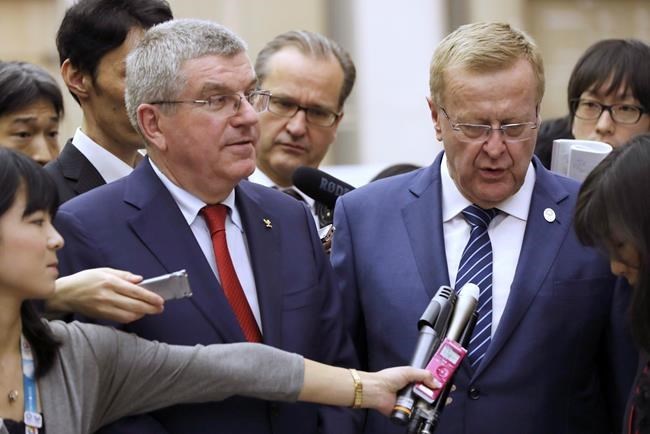
International Olympic Committee President Thomas Bach, left, and IOC Vice-President John Coates, right, answer questions from journalists after a meeting with Tokyo Gov. Yuriko Koike at the Tokyo Metropolitan Government building in Tokyo, Tuesday, Oct. 18, 2016. Bach expressed willingness Tuesday to work with Tokyo officials to try to reduce spiraling cost estimates for the 2020 Summer Games. Bach arrived in Japan amid growing tension between Olympic organizers and recently elected Tokyo Gov. Koike’s push to cuts costs. He declined to discuss specific proposals, saying he only knew about them so far from media reports. (AP Photo/Eugene Hoshiko)
Republished October 18, 2016 - 6:01 AM
Original Publication Date October 17, 2016 - 9:05 PM
TOKYO - IOC President Thomas Bach expressed willingness Tuesday to work with Tokyo officials to achieve a "significant reduction" in costs for the 2020 Olympics, but suggested the effort should stick to the current venue plans.
Bach arrived in Japan amid growing tension between Olympic organizers and recently elected Tokyo Gov. Yuriko Koike, who is pushing to cut costs. A preliminary report from a city expert panel late last month proposed moving three sports from planned new venues to existing ones — including relocating rowing to a site hundreds of miles outside the capital.
Bach reminded the governor that Tokyo should respect the agreement it signed when it was awarded the games three years ago.
"I think it is in the interest of Japan, Tokyo and IOC that we do not change the rules of the competition after the election," Bach said. "By respecting these principles we can very well look into the budget of Tokyo 2020 and we can look at the cost. We can see together how we can make it even more feasible."
Bach proposed four-party talks among the International Olympic Committee, Tokyo organizers, the city government and Japan's central government to agree on additional cost reductions, starting as early as November after Tokyo releases a final report. Bach declined to discuss specific proposals, saying he only knew about them from media reports.
"The Tokyo metropolitan government will finalize its internal study, then we'll discuss it with the other stakeholders ... and then I am confident that you will see a significant reduction in the cost compared to what we have seen so far from the press," Bach told reporters after a 40-minute televised meeting with Koike.
The Tokyo panel's preliminary report said the overall cost of the Olympics could exceed $30 billion — four times the initial estimate — unless drastic cuts are made.
The review focuses on whether each venue can be cost-effective while also contribute to the reconstruction of the area hit by the 2011 tsunami and Fukushima disaster.
"That's how we have promoted to attract the games," Koike said. "We need understanding of the residents of Tokyo as we are relying on their money."
The IOC has suggested the possibility of moving rowing to an existing site in South Korea in case there is no resolution over the Japanese venue, the Asahi newspaper reported, quoting unidentified Japanese sources as saying. The South Korean venue in Chungiu City hosted the 2013 world championships and rowing at the 2014 Asian Games.
Asked about the report at Tokyo's Haneda airport, Bach said: "I will not comment on any kind of rumours." Japanese Olympic Minister Tamayo Marukawa told reporters she could not confirm the report.
Tokyo won the right to host the games in 2013 by promising a compact bid with 28 of the 31 competition venues within a five-mile (eight-kilometre) radius of the Olympic Village. Originally, only shooting, modern pentathlon and one soccer venue were to be outside the radius.
Already, the venues for basketball, taekwondo and cycling have been moved outside of Tokyo to reduce costs by using existing facilities. Cycling was moved to Izu, about 90 miles (145 kilometres) southwest of the capital.
After her election at the end of July, Koike convened a panel of independent experts to review Olympic venues and costs.
Its most drastic proposal has been to suggest moving the rowing and canoeing venue to an existing facility about 250 miles (400 kilometres) north of Tokyo, after the projected cost for a new venue in Tokyo Bay rose to 49 billion yen ($490 million), seven times the initial estimate.
John Coates, an IOC vice-president and former rower who heads the co-ordination commission for the Tokyo Games, was asked about the costs of the rowing site in Tokyo.
"The figures are very large to us," he said. "We can certainly reduce those numbers."
Meanwhile, the Japan Rowing Association and Japan Canoe Federation issued separate statements calling for the venue to stay in Tokyo.
The local organizing committee in Tokyo has objected to the possible move, arguing the competition should remain at the planned Sea Forest Waterway.
It said the existing facility that Koike is exploring in northern Japan's Miyagi prefecture lacks infrastructure, accommodation for spectators and will be inconvenient for athletes.
Tokyo organizers also said the final construction cost for the Sea Forest Waterway will likely be lower than estimated, while additional costs for transportation, security and infrastructure to move the events to Miyagi would add up.
The expert panel has also suggested sticking with the planned venues, but reducing their scale to save money.
___
Follow Mari Yamaguchi at https://www.twitter.com/mariyamaguchi
Find her work also at http://bigstory.ap.org/content/mari-yamaguchi
News from © The Associated Press, 2016